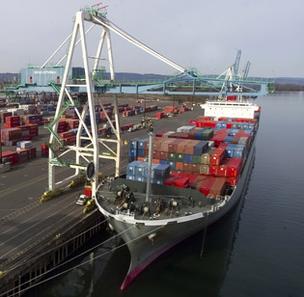forum
library
tutorial
contact

Hanjin's Withdraw Could Raise Costs for EO Products
by George PlavenEast Oregonian, October 25, 2013
|
the film forum library tutorial contact |

|
Hanjin's Withdraw Could Raise Costs for EO Productsby George PlavenEast Oregonian, October 25, 2013 |
 PENDLETON, Oregon -- A major shipping company's decision to withdraw from the Port of Portland by January 2014 means local exporters will face higher transportation costs to move their products overseas, including processed foods and timber.
PENDLETON, Oregon -- A major shipping company's decision to withdraw from the Port of Portland by January 2014 means local exporters will face higher transportation costs to move their products overseas, including processed foods and timber.
South Korea-based Hanjin Shipping Co. announced Oct. 18 it will no longer carry containers out of Portland's Terminal 6 due to rising handling charges and sagging longshore labor productivity. Averaging about 1,600 containers per week, Hanjin handled 80 percent of the city's container business, The East Oregonian reported Sunday.
Port spokesman Josh Thomas said they are having ongoing conversations to persuade Hanjin to stay. In a letter to customers, Hanjin states it will continue to review resuming the service "based on changing circumstances."
If Hanjin leaves, Eastern Oregon exporters would have to pay more to truck containers to Seattle or Tacoma, which cost between $500 and $1,000 per container the last time ships were diverted in summer 2012.
"It was unfortunate news, and news we hoped not to hear," Thomas said. "Having weekly direct call service is a major selling point in this region. Without it, it creates a void that needs to be filled."
Value-added agricultural products like processed potatoes and onions are all shipped by container.
By contrast, Hanjin's departure is not expected to affect bulk grain cargo. Only 2 percent of Northwest wheat is shipped in containers, according to the U.S. Wheat Associates' West Coast Office.
With fewer container carriers out of Portland, businesses are turning to Puget Sound ports instead of barging down the Columbia River.
Kim B. Puzey, general manager at the Port of Umatilla, said the number of ocean carriers in Portland was as high as 12 in 1997. Only Hapag-Lloyd, Hamburg Sud and Westwood Shipping remain at Terminal 6. The effect is rippling to ports upriver, Puzey said, where well-established companies are forced to adjust their business model and fledgling companies may reconsider whether to locate or continue in the region.
"(Hanjin) is a significant loss to ports on the Columbia and Snake river systems," Puzey said "We are down to very little service now, almost nonexistent compared to what we had. Everyone here is having to make transportation adjustments that are significant to their bottom line."
At the Port of Morrow -- Oregon's second-largest port -- General Manager Gary Neal said they have invested in road and rail access that gives their customers the flexibility to keep moving. Portland is their preferred avenue and Neal said losing Hanjin does disrupt their flow.
But for many industries, Neal said it is not uncommon for them to already be exporting out of different ports to reach all their customers worldwide.
"They're sophisticated in what they do," he said. "They're working with the best options they have in front of them. At the end of the day, we want to see how we can secure other services to support our exporters."
Brenda Barnes, export chairwoman with the Columbia River Custom Brokers & Freight Forwarders Association, said she expects the biggest hits to the Eastern Oregon economy would be levied against hay and potatoes.
"Most of your commodities are not soaking up that kind of value per container to absorb that additional cost," Barnes said. "They'll either have to sell at a higher cost, or it will eat at their profit."
Businesses are striving to be competitive by keeping costs as low as they can, Neal said. He doesn't believe losing Hanjin will have as drastic an impact as years past, when exporters were not as diversified.
"As our businesses expand their markets around the world, it's forced them to reach out past the Port of Portland to get to those markets anyway," he said. "They won't pick up and go somewhere else because of this."
learn more on topics covered in the film
see the video
read the script
learn the songs
discussion forum
